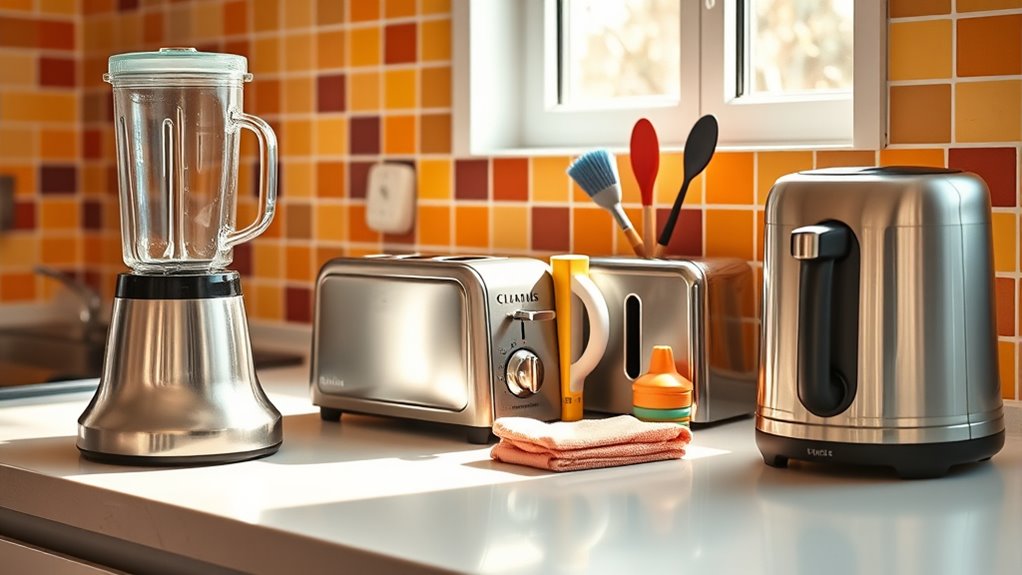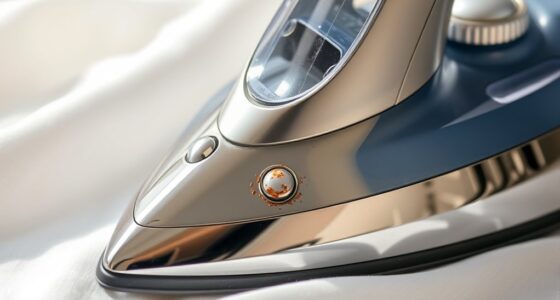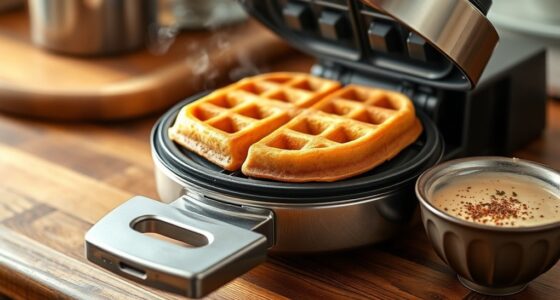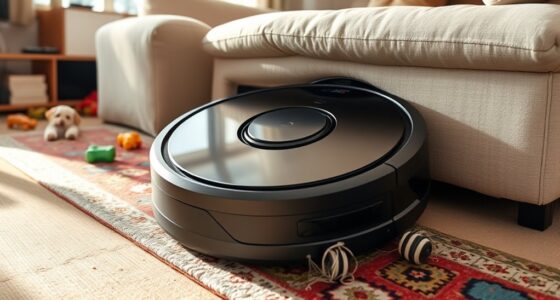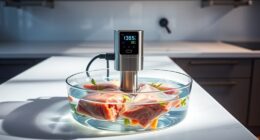To extend the lifespan of your small kitchen appliances in 2025, prioritize regular maintenance, such as cleaning blades, jars, and vents to prevent buildup and improve efficiency. Check for signs of wear, tighten loose parts, and address issues promptly to avoid costly repairs. Lubricate moving parts and store appliances properly to protect them from dust and damage. Continuing with these simple steps will help keep your appliances in top shape longer.
Key Takeaways
- Regularly clean and wipe down appliances to prevent buildup and ensure efficient operation.
- Conduct routine inspections to identify and repair minor damages early.
- Lubricate moving parts and avoid overloading to reduce internal strain and extend lifespan.
- Store appliances properly in dust-free, dry environments with protective covers when not in use.
- Perform scheduled maintenance to maintain energy efficiency and prevent costly repairs.
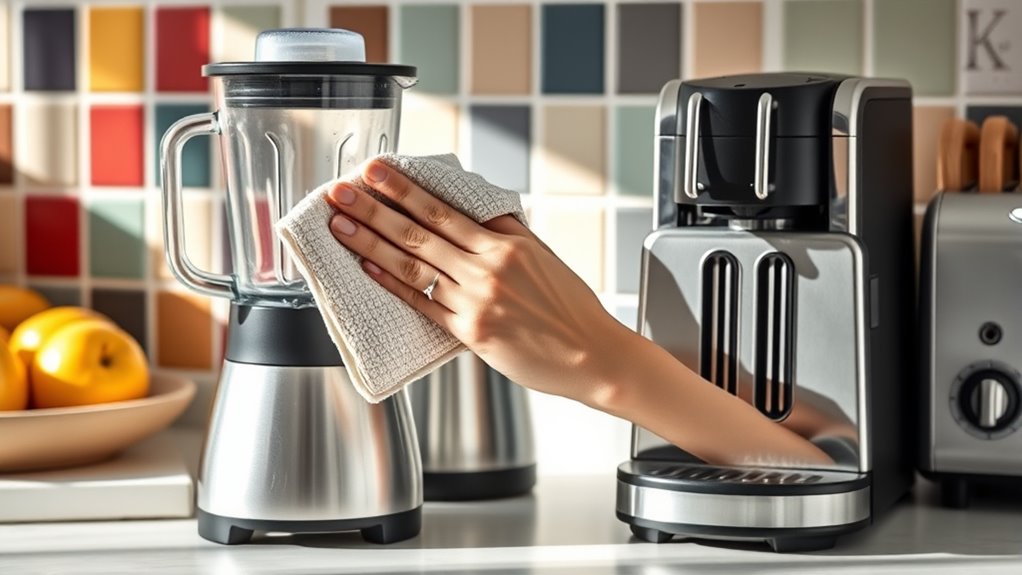
Keeping your small kitchen appliances in top shape is essential for ensuring they work efficiently and last longer. When appliances run smoothly, they not only save you time but also help you cut down on energy consumption, making them more energy-efficient. Proper maintenance begins with understanding how to keep them functioning at their best, which includes adopting simple troubleshooting techniques when issues arise. By addressing problems early, you prevent small glitches from turning into costly repairs or replacements down the line.
Maintaining small appliances ensures efficiency, longevity, and energy savings by preventing small issues from becoming costly repairs.
Start by regularly cleaning your appliances. Dust, food particles, and grease can accumulate over time, affecting their performance and energy efficiency. For example, regularly wiping down your blender’s blades and jar or cleaning the vents and filters of your microwave ensures they operate at their peak. When cleaning, always follow the manufacturer’s instructions to avoid damaging delicate parts. This routine upkeep not only prolongs the lifespan of your appliances but also helps maintain their energy efficiency, reducing unnecessary power consumption.
Another key aspect is inspecting your appliances for signs of wear or damage. Loose cords, frayed wires, or cracked parts should be addressed immediately. Using troubleshooting techniques, such as resetting a malfunctioning coffee maker or checking the power source, can often resolve minor issues without needing professional help. For example, if your toaster isn’t heating properly, ensure the plug is secure and the outlet is functioning. Sometimes, simply cleaning the crumb tray or adjusting the settings can restore its performance. These small fixes keep your appliances running smoothly and prevent small issues from escalating into more significant problems.
Maintaining your appliances also involves paying attention to their moving parts and motors, such as blender blades or mixer gears. Regular lubrication, if recommended by the manufacturer, can prevent unnecessary strain on motors and extend their lifespan. Additionally, avoiding overuse or running appliances beyond their capacity helps preserve their internal components. For instance, don’t overload a food processor or blender, as this puts extra stress on motors and can lead to overheating or burnout.
Finally, storing appliances properly when not in use can prevent damage caused by dust, moisture, or accidental impacts. Covering appliances with dust covers or storing them in cabinets ensures they stay clean and free from debris. When it’s time to use them again, a quick inspection, cleaning, and testing can confirm they’re ready to perform efficiently. Incorporating Glycolic Acid into your skincare routine can also help keep your skin resilient against environmental stressors, ensuring your skin remains healthy and radiant. By adopting these maintenance routines, troubleshooting techniques, and storage practices, you’ll not only extend the lifespan of your small kitchen appliances but also keep them performing at their highest energy efficiency, saving you money and hassle in the long run.
Frequently Asked Questions
How Often Should I Replace My Appliance’s Power Cord?
Think of your appliance’s power cord as the lifeline of your device—if it frays or shows signs of wear, it’s time to replace it. Generally, follow the replacement guidelines of every 3 to 5 years, or sooner if you notice damage like cracks or exposed wires. Regular inspection ensures safety and can markedly extend your appliance’s power cord lifespan, preventing electrical hazards and maintaining smooth operation.
What Are Signs That My Appliance’s Motor Needs Fixing?
You’ll know your appliance’s motor needs fixing if you notice strange signs like increased motor noise or unusual vibrations during operation. These symptoms indicate the motor might be worn out or misaligned. Don’t ignore these signals, as they can lead to further damage. Regularly listening for odd sounds and feeling for vibrations helps catch issues early, ensuring you can repair or replace the motor before it causes more problems.
Can Cleaning Solutions Damage Electronic Components?
Cleaning solutions can damage electronic components if you’re not careful. Harsh cleaning chemicals can cause electronic corrosion, leading to malfunction or failure. Always use gentle, appliance-specific cleaners and avoid spraying liquids directly on electronic parts. Instead, dampen a cloth with cleaning solutions and wipe carefully. This prevents damage, preserves your appliance’s electronic integrity, and extends its lifespan. Proper cleaning guarantees your small kitchen appliances stay in good working order for years.
Is It Safe to Repair Appliances Myself?
Deciding to DIY repair can be daring, but it’s often dangerous without proper training. While minor fixes might seem manageable, complex components require careful handling. You risk damaging the appliance or voiding warranties if you don’t know what you’re doing. For safety and satisfaction, seek professional servicing for intricate issues. Remember, timely professional repairs protect your appliances, prevent problems, and prolong their lifespan, saving you hassle and money in the long run.
How Do I Prevent Mold Buildup in Sealed Appliances?
To prevent mold buildup in sealed appliances, you should regularly clean and dry all surfaces, especially door seals and corners. Guarantee proper appliance sealing by checking for gaps or damage, so moisture doesn’t get trapped. Use mold prevention sprays or vinegar solutions periodically to inhibit mold growth. Keep the interior dry and well-ventilated, and avoid leaving damp items inside for long periods. These steps help maintain a clean, mold-free appliance.
Conclusion
By following these simple maintenance tips, you can extend the lifespan of your small kitchen appliances and save money in the long run. Regular cleaning and proper usage can prevent common issues and keep your appliances running smoothly. Did you know that well-maintained appliances can last up to 50% longer? Investing a little effort now can make a big difference later—so take care of your appliances, and they’ll serve you well for years to come.
